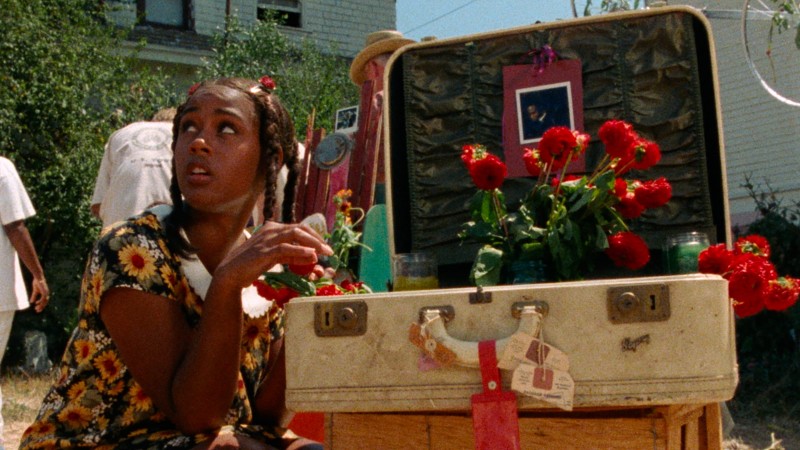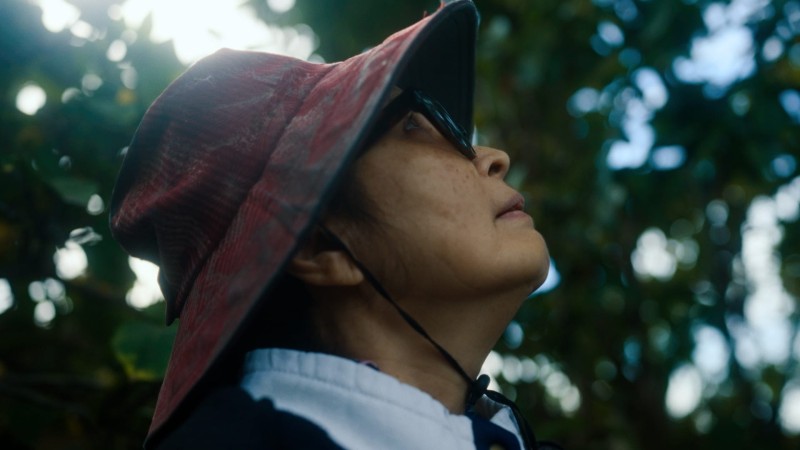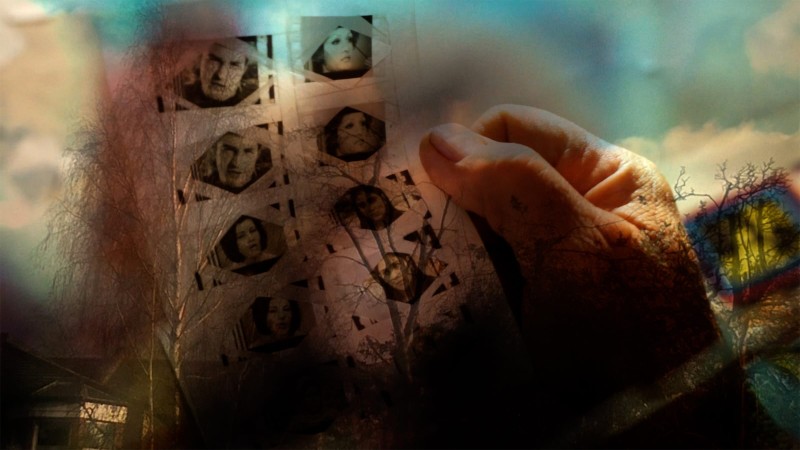A Dream Team: Patricia Resnick on 3 Women

As a film student at the University of Southern California, new to LA and without connections, Patricia Resnick had a habit of following film trucks, just to see where they’d lead. One took her to Westwood and the set of California Split (1974). The director was Robert Altman, her favorite. That afternoon, she hovered around the trucks (“I had more guts than brains,” she says), and when Altman turned up, Resnick told him she wanted to interview him for a paper she was writing on the greatest living director—which was true. He said okay. The next day, Altman called and said he wanted to hire her, not then but later. By the time Resnick graduated in 1975, he had a job for her: assistant to the publicist on Buffalo Bill and the Indians (1976). It was while they were working on that film that he asked if she wanted to write a treatment for the idea that became 1977’s 3 Women.
There’s a rule in the films of Robert Altman: if something works, turn it around and look again. A good Altman picture turns its people and places around so many times, it feels less like a single movie than x number of movies, one for every turn. And with every turn, more flavor. Dreamy and satirical and alarming, 3 Women is a Persona-like slow roast skewered on a spit, a picture of Altman’s frightened unconscious if it woke up in, well, Dodge City. Resnick, whose career as a Hollywood screenwriter was launched that day on the California Split set, would go on to collaborate with Altman on A Wedding (1978) and Quintet (1979) and appear briefly in The Player (1992). Here, she discusses her work with the filmmaker and his translation of 3 Women from brain to screen.
Sam Wasson: So you’re working on Buffalo Bill—
Patricia Resnick: Here’s what happened. He was producing Bob Benton’s movie The Late Show. Lily Tomlin was in it, and she was improving a lot of her dialogue, and she was asking for suggestions. And I was there and threw out some suggestions she liked. She eventually asked me to write a couple pieces for what became her first Broadway show. Altman went to see the show and said, “Oh, the kid can write.”
SW: It was around this time—as Altman told it—that his wife, Kathryn, got sick and he had this dream, a sort of nightmare.
PR: The dream was mostly cast and setting, more than it was story. Sissy and Shelley were in the dream. And he had the desert and something about switching personas. Those things were there, but they were vague. It was a dream.
SW: And he takes the dream to Fox?
PR: Yes. He had a good relationship with Fox and told them about this dream, and they said, “Great, but we’re not going to finance this dream without seeing something on paper.” So Altman came to me and said he wanted a treatment written, and if Fox moved forward with the film and wanted a script, I could come on as screenwriter and that would be my first screenwriting credit.
SW: Beyond the dream elements, was Altman specific about wanting anything else in the treatment?
PR: No. He just wanted a treatment, about fifty pages. We knew there had to be something of a story and we knew there had to be a third woman.
SW: Why?
PR: He just wanted a third woman. He liked the title 3 Women, so we needed a third woman. That was Bob.
SW: Did he let you go from there or did he work closely with you on the treatment?
PR: At the time, I was sharing an office with Scotty Bushnell, who was his right-hand person, who was casting all the time, so all these actors were running in and out. Ed Ruscha was around a lot, and various other sundry people. I was upstairs and Altman was downstairs, and he would come up all the time and we would go over everything, about every ten pages or so. But mostly he just let me go. It wasn’t like most writing—a collaboration between left brain and right brain. With this, I tried to use my left brain very little—I tried to dream it also.
SW: How did he give notes on a piece of unconscious writing based on a dream?
PR: He wasn’t a real note giver. I don’t think I ever got a written note from him on anything ever. Generally, conversations would be more about what he was seeing. I’d show him pages, and he’d say, “Okay, good, but I really want a run-down bar with all this crap out in the back, with shit piled up. I want that.” That was an Altman note. You know what I mean? He wasn’t a reader. Trying to get him to read a book or script was impossible. I wondered in later years if he might have been dyslexic, not seriously, but he was that averse to the printed word. His process was completely anti-intellectual. I remember at one point there was a film he wanted to make, a film based on a book, not a particularly good one, and it was set in a factory. He liked the idea, visually, of the factory—and that did it. He went from there to try to make a movie around it, but it didn’t go forward. That’s sort of how we worked on 3 Women. He’d like something and in it went.
SW: How long did the treatment take you?
PR: About a month. I wrote it quickly. When I finished, he was very happy with it, and he went to Fox, which decided to go ahead with it. And then a couple weeks later, he called me into his office and said, “I’m really sorry, but I’ve decided not to do a screenplay. I’m going to have the actors do it. But I’ll have you work on the movie in some way, as an extra or PA or something.” He knew I needed some kind of job. I was only twenty-two, twenty-three, and without any other prospect. So I was pretty devastated. Altman was the only Hollywood connection I had.
SW: Did he end up writing an actual script?
PR: What ended up happening, when they went out to the desert, near Indio, they came upon things he wanted to use, like the spa and the bar. You know, Altman was a very visual person. What got him going was mood and visuals and tone and certain funny things about people, like when Shelley gets her dress caught in the door. So most of what was written—if you can call it that—happened once they were out there. I know Shelley had a huge amount of input into that character. She wrote those diary entries, and all that stuff about shopping and cooking was hers too. That’s the way he liked to work. He’d say to the actors, “Look, I’m willing to take suggestions from anybody about anything. If the actors have an idea about craft service, if the craft service guy has an idea about acting, I want to hear it. I only reserve the right to say no without having the time to explain to you why.” So everyone would get very involved. The actors especially would get very involved in their characters.
SW: 3 Women is free-form, even for an Altman film.
PR: As far as I know, there was no script. That doesn’t mean they were improvising. He would rehearse with them, and everyone could set what they were going to do. By the time the camera rolled, they had it down. I can tell you, I was one of the writers on A Wedding andQuintet; I was in the huge opening shot of The Player, pitching with Joan [Tewkesbury]; and I was intimately involved in Buffalo Bill,and there was always something of a script on paper, whether they stuck to it or not. The actors were given dialogue. Nashville too.
SW: He worked with you and Joan on several occasions.
PR: Yes. But inevitably what would happen is we would leave him. I remember he was really angry with Shelley because she had left him to do other things. When I left him, he was angry with me for years. Everybody did, because ultimately it was always Robert Altman’s movie, and so if you ever wanted to grow and gain your own reputation, you had to leave. It made him very hurt. He was open about it. If he saw you, he would tell you that he was angry.
SW: It’s a fascinating paradox. On the one hand, it’s always Robert Altman’s movie, but on the other hand, here’s a guy who’s taking you, a twenty-three-year-old PA, and giving you a writing gig. It’s not just that he’s reusing his people, it’s that he’s using them in new ways. He is growing them.
PR: He really came through for me on A Wedding. During the time he was making 3 Women, he was already working on the idea for A Wedding and started talking to me about coming on as one of the screenwriters. He promised me that that time he wouldn’t change his mind, which he didn’t. And that became my first credit. I remember him coming up to me at a party, he’d been drinking a little, and he said, “You see, I gave you my promise and I followed through. I’m not such a bad guy, right?” And he gave me a hug. We were good until I left to pursue my own things, and he was really angry with me for a long time, and then I went and visited on Short Cuts. By then, he had gotten over it. I always thought he was the most amazing person, and shooting his films was the best time. I always described it as summer camp for adults. That’s what it felt like.
SW: Like a family?
PR: Very much. I went down to be an extra on 3 Women for three or four days. I was involved in the scenes at the apartment complex. I played one of the neighbors. The dailies were always a big party, and everyone would be drinking and smoking and eating popcorn, hanging out. And Altman was very into gambling, so there was always a football game in the background and people would be placing bets all the time. He had these high-stakes backgammon games with [agent] Sam Cohn when he’d come to visit. The actors didn’t just come in for their bit; everyone was there for the whole shoot. So you really did become very close. Janice Rule was married to Ben Gazzara. So he was always there hanging out. What else was there to do in Indio? He always had really interesting set visitors. While I was there, Julie Christie, who had done McCabe, came to visit with a girlfriend of hers, and he put me in charge of entertaining her. I was so starstruck. I was so completely insane about her. I could barely speak to her, let alone entertain her. Fortunately, she came up with this idea of playing a charades game, so now not only do I have to entertain Julie Christie but I have to act with Julie Christie. And Shelley was dating Paul Simon, so he came to visit. The height disparity there was pretty great.
SW: How does Shelley work?
PR: Shelley is what you see is what you get. No pretentions. She was an eccentric. Her home in LA was filled with just hundreds of animals. She had a massive number of birds. There might have been fifty. Like Altman, she was about feeling what was right. Sissy was more about working things out beforehand.
SW: The unsung hero here is Alan Ladd Jr., at Fox, who put up the money—
PR: —for a dream, yes.
SW: But why? What did he have to go on?
PR: Things really were different then. This was a period of time when the people on the business side loved movies. Of course, they were always hoping for another M*A*S*H, but they believed in him. They wanted to make great movies. I used to socialize with those executives. They were movie buffs.




